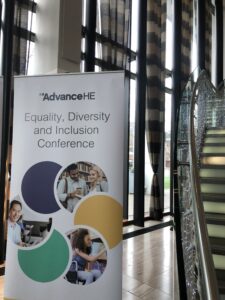Advance HE EDI Conference 2024

I recently attended the Advance HE EDI Conference in Liverpool, to gather ideas and hear about the excellent EDI work happening across the HE sector. It was brilliant to see such a diverse range of delegates and speakers, hearing
perspectives across all genders, ethnicities, and backgrounds.
The overarching theme of the conference was belonging, and the connection this feeling has with Equality, Diversity and Inclusion, often working together to create a better working environment. This is especially important in the University, both to improve belonging and also to ensure the environment is inclusive for all students and staff who study or work here.
The keynote speaker for day one was Marcia Wilson, PVC for London Metropolitan University. Her talk was titled “The EDI B(l)acklash: Causes, Consequences, and Casualties”, and she discussed the backslide seen across the HE sector regarding racism and racial diversity. Marcia discussed some horrific cases of discrimination which have been reported this year, and talked about how a passive, slow response to these instances just exacerbates the problem. She answered questions from the audience about how to deal with cases of discrimination like this, the key takeaways surrounding showing empathy and support, taking action quickly and not letting cases of discrimination slide for fear of “getting it wrong”.
There was some brilliant research presented by Obimobi Oneyeukwu-Onyenso from the University of Liverpool about the untold histories of people of colour, especially relevant in the city of Liverpool, one of the main ports in Great Britain during the Transatlantic Slave Trade. In fact, my hotel was just a five minute walk away from the docks where slave ships were built. This was thought-provoking to everyone attending the conference, and led to many discussions surrounding accountability, and the connections Universities had with the slave trade.

One of the oldest docks in Liverpool, where slave ships would have been built in the 18th and 19th centuries.
Alongside hearing about some fantastic positive action and practice (including menopause staff networks, Mirror Leadership Boards, and intersectional projects to bring together different awarding charters), there were some great insights into how we can do research and data analysis. The University of Sunderland discussed using reflexive research practice during their creation of staff networks. This practice encourages researchers across the sector to think of their own beliefs, judgements and practices during the research process, and examining how they influence the research.
Advance HE data analysts discussed how they used mixed methods approaches to account for very low numbers of individuals in datasets. This is especially relevant for special category data such as race and disability, as these often have very few numbers and thus cannot be accurately reported on in the University.
Overall, the key takeaways from the conference all fed in to the theme of belonging, with research and projects discussing the issues, including recruitment and pay gaps, and leaky pipelines across the sector regarding race, gender, and class. Others showcased their projects which address these gaps with intersectional outlooks, support groups, and by utilising the diverse body of students to inform changes and practices which will allow inclusive, equal practice to thrive.




Recent comments